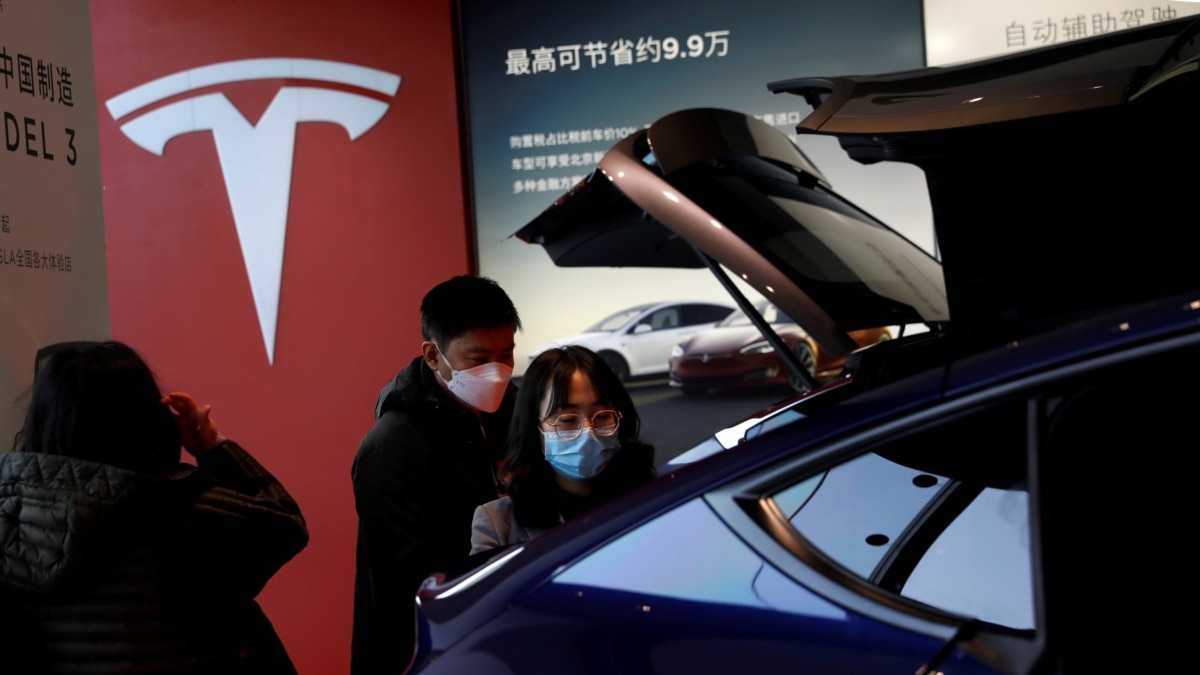Western electric vehicle (EV) manufacturers are trying to reduce their reliance on rare earth metals from China. As tensions rise between this nation and others, including the United States, manufacturers fear that supplies could be limited.
Electric vehicles use special magnets to power their motors.
Most are made of rare earth metals.
The metals are not really rare. But they can be dirty and difficult to work with. And China is the leader in manufacturing. The demand for magnets is growing for all forms of renewable energies. Experts say a real shortage could be imminent.
Some automotive companies have been trying to replace rare earth metals for years.
Automakers in the West claim that they don’t just secure supplies. They also worry about huge price increases and environmental damage that occurs during production.
In the past twenty years, western countries have largely stopped producing rare earth metals. The production is complex and often dangerous Byproducts.
FILE PHOTO: Polluted water flows from pipes of a rare earth factory near Baotou, a town in China’s Inner Mongolia Autonomous Region, in this 2010 image (Reuters) ur.
High costs for automobile manufacturers and the environment
Rare earth magnets are usually made of neodymium. The magnets are widely considered to be the most effective way to power electric vehicles (EVs). China controls 90 percent of its supply.
The prices for neodymium oxide more than doubled within nine months last year and are still up by 90 percent.
One of the companies trying to stop using the magnets is Japanese automaker Nissan. The company told Reuters that it is discontinuing the use of rare earths from the engine of its new Ariya model. Germany’s BMW did the same for its iX3 electric sports utility vehicle this year. And the world’s two largest automakers – Toyota and Volkswagen – told Reuters that they are also reducing the consumption of the minerals.
Rare earths are needed for the electronics, renewable energy and defense industries. Because some can produce a continuous magnetic force, the magnets they make are called permanent magnets.
Electric cars with permanent magnets need less battery Performance and can go further than with conventional magnets. The special magnets were the clear choice for electric vehicles until around 2010, when China threatened to reduce supplies of rare earths during a conflict with Japan. The prices have risen sharply.
Now delivery worries are opening a gap between Chinese electric vehicle manufacturers and their Western competitors.
Even though automakers are mining in the West, the Chinese are still building vehicles with permanent magnets. A Chinese rare earth industry official told Reuters that China could “meet all global needs” if political risks were put aside.
Now companies are developing electric motors without the metals or recycling more of the magnets from existing vehicles.
BMW has revamped its EV technology to make up for the rare earths shortage. Automaker Renault made its rare earth-free Zoe model for a growing number of city cars that don’t require long battery life.
The US electric car maker Tesla will do both types of Engines.
Electric vehicles and wind turbines
Although auto sales declined during the pandemic, demand for neodymium magnets in electric vehicles rose 35 percent in the past year alone.
The magnets are also in demand for wind power plants, so-called turbines.
For many EV drivers, distance concerns may not be an issue.
“Most people drive less than 160 kilometers a day,” says researcher Jürgen Gassmann from the Fraunhofer Institute for Material and Beam Technology in Germany.
However, some companies, like Toyota, are still using permanent magnets, but have reduced the use of rare earths. They developed a magnet that requires 20 to 50 percent less neodymium.
The use of rare earth-free electric motors is expected to increase almost eightfold by 2030, says Claudio Vittori. He is an expert at the American-British information provider IHS Markit. But he said permanent magnet motors will still prevail, mainly because of their performance and Efficiency.
If the predictions are correct, it is unclear that even these changes can affect the rare earths market.
I am Bryan Lynn. And I’m Caty Weaver.
This was reported by the Reuters news agency. Alice Bryant adapted it for learning English. Caty Weaver was the editor.
Quiz – Manufacturers of electric cars are looking for a replacement for rare earth metals

Start the quiz to find out
___________________________________________________________
Words in this story
By-product – n. something that arises from the manufacture or destruction of something else
battery – n. an electrical cell or connected electrical cells for the provision of electrical current
recycle – v. use (some) again
Efficiency – n. the ability to do or produce something without wasting material, time or energy : the quality or the degree of efficiency
Engine- – n. a machine that generates motion or force to do work

